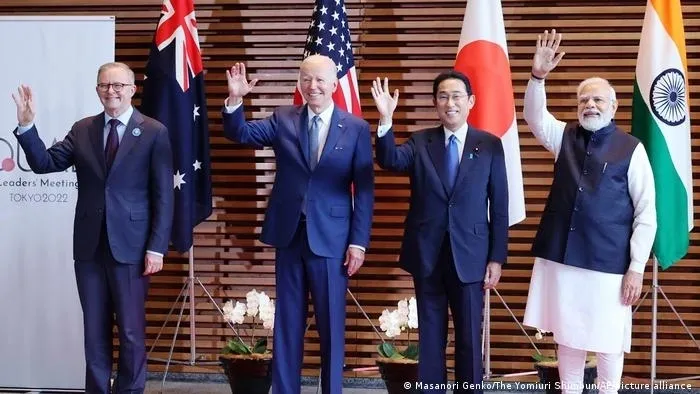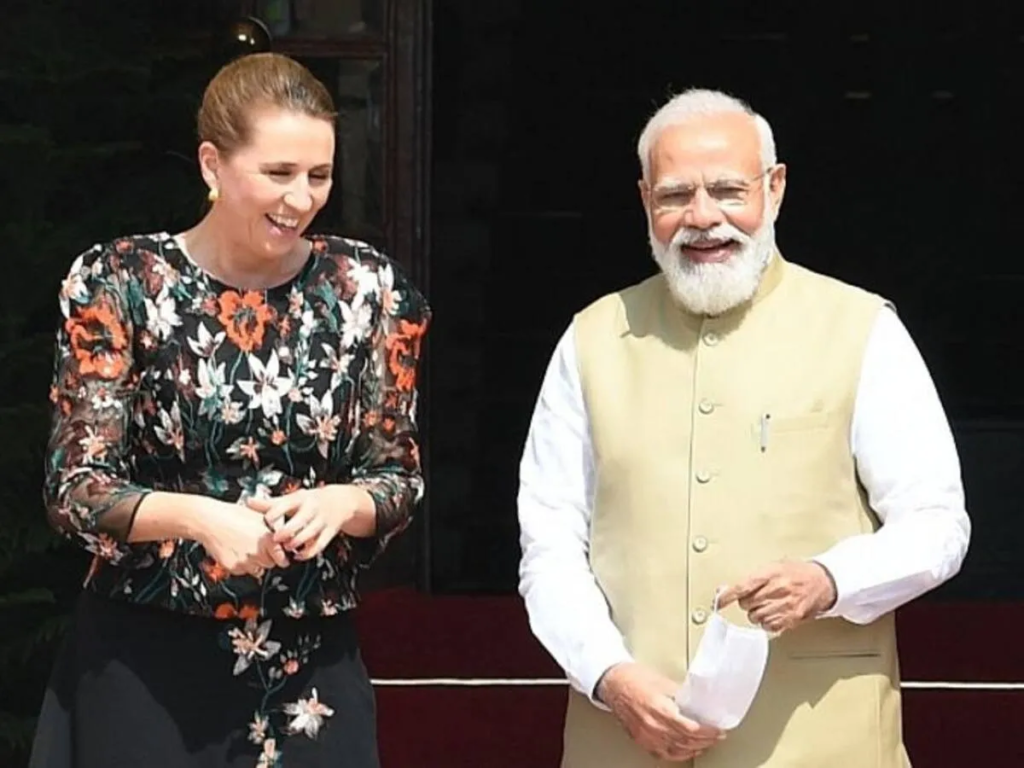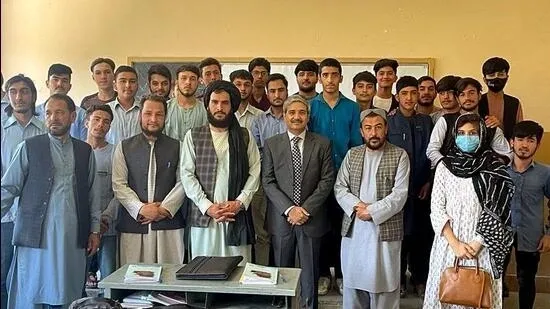The coinage of the term Indo-Pacific is not derived from a geographical merger of two oceans, the Indian and the Pacific. As scientists have long argued and proven that due to the differences in temperature, density, and molecular formation of ocean water on earth, the two oceans cannot be merged or mixed. Hence, the term Indo-Pacific is an ‘imagination of space’ that is stemmed from a political parameter and geographical demarcation.
India’s definition and vision of the Indo-Pacific region have been made in PM Narendra Modi’s 2018 keynote address at the Shangri-La Dialogue in Singapore. For India, the Indo-Pacific region constitutes “from the shores of Africa to that of the Americas” (Dialogue, 2018).
States in the Indo-Pacific region have started to recognize the importance of engaging in smaller, informal, more targeted, interest-based groupings to work on various issues that are difficult to resolve in larger forums. In the context of India’s presence in the Indo-Pacific region through multilateral groupings, the Quadrilateral Security Dialogue (QUAD) becomes an important grouping. Hence, the research essay attempts to discuss the QUAD grouping and analyze its relevance in the Indo-Pacific region.
Quadrilateral Security Dialogue

In 2004, a tsunami in the Indian Ocean brought four nations together to meet the unprecedented crisis in the region. The initial success of this “minilateral” grouping made these four countries in the Indo-Pacific region- Australia, India, Japan, and the United States, ponder over the idea of forming an informal security grouping of like-minded countries that would provide a mechanism to tackle the dynamic challenges that arise in the region. Japan, under the leadership of former Prime Minister Shinzo Abe, was the first country to express, in 2006 during a visit to India, forming a security dialogue in the region. Following in the year 2007, on the sidelines of the ASEAN Regional Forum (ARF) in Manila, the four QUAD countries met for the first time. However, the QUAD 1.0 grouping faced an initial failure since Australia, a close economic partner of China, was hesitant to continue being a member of the grouping in front of Beijing’s sensitiveness over the possibility of QUAD being an ‘Asian NATO’ in the Indo-Pacific region to contain the rise of China.
Nonetheless, in past few years, not only QUAD countries but several other nations in the Indo-Pacific region have witnessed growing Chinese assertiveness in the region and claims of Beijing over their sovereign territories. Alone in the case of India, New Delhi has met with 4 such aggressive activities of Beijing at the border in the past decade- 2013 (Depsang Plains), 2014 (Chumar), 2017 (Doklam), and 2020 (Galwan Valley). Secondly, Japan and China have a long unresolved dispute in the East China Sea over the Senkaku Islands and fishing activities. As for Australia, whose relationship with China was largely viewed as to be robust in the region, in a short span became turbulent and the growing partnership between the two countries took a down-turn. For example, in 2018, a significant concern for Canberra was Chinese interference in its domestic politics. In the context of the Washington- Beijing power tussle in the region, 2011, records a US trade deficit with China of an all-time high of $295.5 billion (Amadeo, 2021).
Besides, the leadership change in China has also marked a paradigm shift in Sino-US relations. While China under Xi Jinping started to grow rapidly domestically as well as internationally, it also brought Chinese belligerent activities into the region such as the militarization of the South China Sea. Furthermore, in 2018, China faces the Trump administration’s sweeping tariffs on Chinese imports worth $50 billion against the allegations of theft of Washington’s intellectual property (Lynch, 2018). Since then, the US-China trade war has not ceased to escalate. In addition, in 2021, Washington urged the NATO grouping to declare Beijing a ‘Security Challenge’ against the backdrop of its military modernization (Aamer Madhani, 2021). Hence, Indo-Pacific has indeed become a backyard for Sino-US rivalry.
As these incidents unfolded in the Indo-Pacific region among the major economies, a simultaneous possibility of revival of QUAD 2.0 prevailed. Consequently, in the year 2017, the security grouping of Australia, India, Japan, and the United States was revived. The following paragraphs attempt to summarize major summits and meetings of QUAD 2.0 to analyze its relevance in the Indo-Pacific region:
QUAD meeting in Manila, the Philippines (12 November 2017) – As per the press release of (Affairs, 2017), the meeting led the objectives for the Indo-Pacific that promotes cooperation based on values of peace, stability, and an inclusive Indo-Pacific region. Some of the common challenges discussed in the region included terrorism and enhancing regional connectivity. Furthermore, New Delhi emphasized that the Act Policy of India best explains its engagement in the Indo-Pacific region that envisions fostering relations with India’s extended neighbors in the region to enhance economic cooperation, and strengthen strategic partnerships (QUESTION NO.2459 TARGETS OF ACT EAST POLICY, 2022).
The ministerial meeting of QUAD (2019)– The QUAD grouping met on 26 September 2019 on the sidelines of the United Nations General Assembly. In continuation of these ministerial talks, senior officials of the QUAD countries met in Bangkok the same year for furthering the consultations. Referring to the US statement, the grouping reflected upon ‘practical collaboration’ concerning maritime security, humanitarian aid, cyber security, and counter-terrorism. The grouping also reiterated the ‘centrality’ of ASEAN in the Indo-Pacific region.
Malabar Exercise 2020– In 2020, for the first time in a decade, the four QUAD countries participated in a naval exercise in the Indo-Pacific region. The Malabar exercise with QUAD countries is significant for its timing as it occurred amidst the Sino-India Galwan stand-off and rising covid-19 threat to the world. The Malabar exercise was a bilateral initiative of the Indian Navy and US Navy since 1992. Later on, in the year 2015, Japan became a permanent participant in the exercise. In the year 2007, Singapore and Australian navies participated but as mentioned earlier, Australia stopped its participation in the exercise from 2008, until recently; in 2020, Australia re-joined the exercise (Kumar, 2017).
QUAD leader’s first virtual Summit (12 March 2021)- The virtual summit held earlier in the year 2021 is special as it comes at a time when the world was gripped by the tyranny of the Covid-19 pandemic. QUAD leaders in their joint statement asserted that they promote a free, rules-based order for a secure and prosperous Indo-Pacific region. Just like at the ministerial meeting, even this virtual summit reiterated the centrality of ASEAN in the Indo-Pacific region.
Further, the summit outlined common challenges of the region- global health, climate change, infrastructure development, humanitarian aid, and cyber security. Against the backdrop of the covid-19 pandemic, the grouping promised equitable vaccine access by collaborating with the WHO and COVAX. Besides, by referencing the UNCLOS for maritime security in the Ind-Pacific, the grouping subtly commented on the East and the South China Seas’ hostility caused by China. The QUAD grouping also announced that- the vaccine working group, emerging technology working group, and climate working group would be formed to tackle the dynamic problems emerging in the Indo-Pacific region.
First-in-person QUAD leader’s summit (24 September 2021)- The first-in-person QUAD summit of PM Morrison, PM Modi, PM Suga, and President Biden happened in Washington at the White House. Following the challenges of the Indo-Pacific region mentioned during the virtual summit, QUAD leaders at the September 2021 summit launched the ‘QUAD Vaccine Partnership’ to facilitate vaccines in the region. In addition, the grouping promised to donate more than 1.2 billion vaccines globally. While India has been one of the first countries to export vaccines to several countries, the QUAD grouping appreciated New Delhi’s decision to resume the export that was temporarily paused given the rising cases at home.
As for other member countries- Japan with $3.3 billion in the COVID-19 Crisis Response Emergency Support Loan program; Australia with $212 million in grant aid has promised their contribution (House, 2022). Secondly, the summit focused on infrastructure development in the Indo-Pacific region, drawing from the Build Back Better World (B3W) of the G7 grouping. The Summit marked the launch of the QUAD infrastructure coordination group. Thirdly, concerning the rising climate change issue, QUAD countries have asserted to focus on achieving the 2030 national targets. In addition, QUAD countries have launched a ‘Green-Shipping Network’ with the help of its QUAD Shipping Taskforce. They also set the target of establishing 2-3 QUAD corridors with zero-emission shipping. And to promote people-to-people connections, QUAD has launched the ‘QUAD Fellowship’ to pursue degrees at universities in the United States. Lastly, The QUAD has outlined to launch ‘technical standard contact groups’, ‘semiconductor supply chain initiative’, and a ‘QUAD senior cyber group’ in the future.
QUAD foreign Minister’s meeting (11 February 2022)- the highlight of this meeting is that the Japanese Foreign Minister expressed his concerns over ‘unilateral attempts’ to change the status quo in the South China Sea and the East China Sea, indicating towards Chinese belligerent activities in the region. In addition, the ballistic missile launches by North Korea were condemned as they violate U.N. Security Council Resolutions. The decision to conduct a foreign minister’s meeting every year was taken during this meeting. In light of the ongoing Ukraine crisis, the QUAD leaders appreciated India’s stand to call for an end to the conflict, says Australian High Commissioner (Bhatacherjee, 2022).
QUAD Joint Leaders’ Summit (24 May 2022)- the latest QUAD leaders’ summit was concluded on 24th May 2022 in Japan. The joint statement of QUAD countries provides an overview of the activities of the security grouping (FACT SHEET: Quad Leaders’ Tokyo Summit 2022, 2022). The leaders of QUAD unveiled the Indo-Pacific Partnership for Maritime Domain Awareness (IPMDA) which provides nations in the Indo-Pacific region to monitor their maritime territories. This initiative ultimately helps in responding to growing challenges like climate change, fisheries, etc. The summit also shed light on the QUAD fellowship that shall sponsor 100 QUAD countries’ students to study in US universities. Furthermore, concerning covid-19 measures, the United States has committed to providing pediatric and booster doses, and India’s Biological E Ltd. will continue to facilitate vaccine manufacturing support. Since its inception, the QUAD grouping has provided special attention to climate change.
Against this backdrop, to advance the activities of the ‘Shipping Task Force’, QUAD transportation ministers and Energy Ministers plan to develop a 10-year Clean Energy Supply Chain Plan. Besides, the Coalition for Disaster Resilient Infrastructure (CDRI) shall cooperate on challenges arising from the Climate Change issue. Further, the QUAD grouping aims to find suitable solutions for the supply chain vulnerabilities in the Indo-Pacific. Besides, cybersecurity is an emerging concern in the Indo-Pacific region that has gained the attention of the QUAD leaders. For enhancing cooperation in cybersecurity, QUAD has launched Computer Emergency Response Teams (CERT) for exchanging relevant lessons. On the other hand, QUAD grouping with three of its countries leading the space domain- the United States, India, and Japan, have vowed to strengthen space cooperation by exchanging satellite data and enhancing capacity building. Lastly, infrastructure development and humanitarian aid were discussed too during the leader’s summit in Tokyo.
Based on the above discussion, the QUAD is an emerging minilateral grouping that envisions cooperating on rising dynamic challenges in the region such as climate change, covid-19, illegal fishing, piracy, infrastructure development, etc. Though India is a part of multilateral forums like the East Asia Summit and the Indian Ocean Rim Association, however, smaller groupings like QUAD and JAI provide a mechanism to deal with specific, targeted issues.
In addition, India is the only country that directly shares a direct land border with China. While the major powers in the region have been talking about the need for a democratic collaboration for a free and safe Indo-Pacific, for the US, India is an essential partner in the QUAD.
Nonetheless, the centrality of ASEAN in India’s Indo-Pacific strategy indicates that “minilateralism” is a space or perhaps a bridge between bilateralism and multilateralism; it doesn’t replace the other two but rather compliments them for the greater goal of inclusivity, openness, and rules-based order in the Indo-Pacific region.
References
Aamer Madhani, J. L. (2021, june 14). NATO leaders declare China a global security challenge. pbs.org. Retrieved April 27, 2022, from https://www.pbs.org/newshour/world/nato-leaders-declare-china-a-global-security-challenge
Affairs, M. o. (2017, November 12). India-Australia-Japan-U.S. Consultations on Indo-Pacific. India: Ministry of External Affairs. Retrieved April 27, 2022, from https://mea.gov.in/press-releases.htm?dtl/29110/IndiaAustraliaJapanUS_Consultations_on_IndoPacific_November_12_2017
Amadeo, K. (2021, October 25). U.S. Trade Deficit With China and Why It’s So High. The Balance. Retrieved April 27, 2022, from https://www.thebalance.com/u-s-china-trade-deficit-causes-effects-and-solutions-3306277
Bhatacherjee, K. (2022, March 20). Quad has accepted the Indian stand on Ukraine, says, the Australian envoy. India: The Hindu. Retrieved April 27, 2022, from https://www.thehindu.com/news/national/ukraine-no-reason-to-be-unhappy-with-indian-stand-says-australian-envoy/article65243901.ece
Dialogue, P. M. (2018, June 01). Prime Minister’s Keynote Address at Shangri La Dialogue. Singapore, Singapore: Media Center of Ministry of External Affairs. Retrieved May 02, 2022, from https://www.mea.gov.in/Speeches-Statements.htm?dtl/29943/Prime+Ministers+Keynote+Address+at+Shangri+La+Dialogue+June+01+2018
FACT SHEET: Quad Leaders’ Tokyo Summit 2022. (2022, May 24). white house. Retrieved May 25, 2022, from https://www.whitehouse.gov/briefing-room/statements-releases/2022/05/23/fact-sheet-quad-leaders-tokyo-summit-2022/
House, W. (2022, September 24). Fact Sheet: Quad Leaders’ Summit. Washington, united states wh.gov. Retrieved April 27, 2022, from https://www.whitehouse.gov/briefing-room/statements-releases/2021/09/24/fact-sheet-quad-leaders-summit/
Kumar, A. (. (2017, August 08). The Malabar exercises and Maritime security. India: Ministry of External Affairs. Retrieved May 27, 2022, from https://mea.gov.in/distinguished-lectures-detail.htm?691
Lynch, D. J. (2018, April 03). Trump administration targets $50 billion in Chinese electronics, aerospace, and machinery goods with tariffs. The Washington Post. Retrieved April 27, 2022, from https://www.washingtonpost.com/business/economy/trump-administration-targets-chinese-electronics-aerospace-and-machinery-goods-with-50-billion-in-tariffs/2018/04/03/9be42e5e-3786-11e8-9c0a-85d477d9a226_story.html
QUESTION NO.2459 TARGETS OF ACT EAST POLICY. (2022, March 24). Media Center, Parliament Q & A. Retrieved April 27, 2022, from https://www.mea.gov.in/rajya-sabha.htm?dtl/35027/QUESTION+NO2459+TARGETS+OF+ACT+EAST+POLICY



